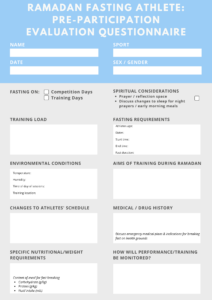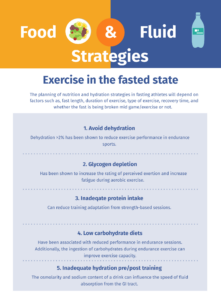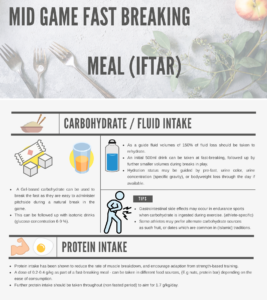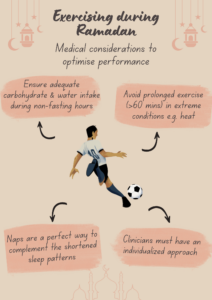A pre-participation evaluation medical questionnaire to support the fasting athlete.
Introduction
The month of Ramadan presents a unique challenge for Muslim athletes, with regards to planning for competition and training, whilst fasting. During this month, many Muslim athletes abstain from consuming food and fluid during day light hours (from dawn to sunset), increasing their focus on self-reflection and prayer as part of one of their key pillars of faith. Professional athletes exercising in the fasted state may also present with several health issues, particularly in extreme environmental conditions and/or if the athlete suffers from any underlying medical conditions.
We propose, for the first ever time, a pre-participation evaluation questionnaire for Ramadan fasting athletes. This will aim to assist and guide discussions between the Sports Medicine & Science teams and fasting athletes to support their wellbeing and safe participation in sport during Ramadan.
Understanding the needs of fasting athletes
Many athletes may have previously exercised or trained during their academy/non-professional years whilst fasting in Ramadan. Consequently, it is likely that they have self-regulated their training loads without the input from medical and coaching staff. This represents a challenge to medical teams, as it may not be apparent which players are exercising in the fasted state. It is customary for many athletes to maintain their normal activities, as best as possible, and integrate fasting within their day-to-day lives.
Awareness of how to adapt training and nutrition for fasting athletes were previously based on personal experience or recently available expert guidance (1–4). Although there is increasing awareness and advice for fasting athletes, many athletes anecdotally report changes to training, sleep and nutrition without seeking medical advice. This is typically attributed to the lack of Ramadan-specific awareness of some Sports Medicine, Sports Science and/or coaching support staff.
To the best of our knowledge, there have been no attempts to develop a standardised and validated ‘’Ramadan and sport pre-participation questionnaire’’. We, therefore, propose that early dialogues between the Sports Medicine & Science teams and fasting athletes can help to identify any health concerns and support inclusivity in sport.

Figure 1 – Ramadan Fasting Athlete: Pre-Participation Evaluation Questionnaire
This is an early draft to commence open discussions with specialists and clinicians working with athletes. We hope to develop a more comprehensive and pragmatic tool for the future.
Approaching discussions around the impacts of Health, Nutrition, Sleep and Training on exercising whilst in the fasted state.
Sleep, nutrition, body composition, training loads and recovery need to be closely monitored to optimise sport performance during Ramadan (5). Thus, depending on the athletes’ sex, sport, competition level, preferences and habits, a tailored sensitive approach can be utilised to address these factors.
Sleep
- Ramadan consists of changes in eating schedules and sleep patterns, as it is common practice to wake up for a pre-dawn meal and attend late night spiritual prayers (Taraweeh).
- This can lead to significant changes in:
- Circadian rhythm
- Hormones
- Early morning rapid eye movement (REM) sleep (6,7)
- These factors may impact athletes’ sleep quantity and quality, which may negatively impact athletic performance and recovery (8–10). Clinicians can take this into account to better advise athletes, keeping in mind the potential use of short naps during the day to help complement athletes’ sleep (11,12).
- Furthermore, athletes may need to be reminded to avoid caffeine intake during the evening, as it can reduce sleep latency (time to fall asleep).
- Some athletes have also reported the anecdotal use of foods containing exogenous melatonin (tart cherry juice) and foods containing Tryptophan to aid sleep quality and duration.
- These foods have not been validated in Ramadan fasting athletes and the use of any supplements should conform to international (WADA) and national guidance on the use of supplements (food-first approach) (13,14).
Nutrition
- Ramadan fasting can potentially decrease overall carbohydrate consumption, which is consistent with a depletion in the stores of muscle glycogen (15). Thus, fasting athletes are prone to accelerated depletion of glycogen stores through vigorously intense physical activities during sport (16).
- Clinicians should be aware of the importance of taking into account the athletes’ nutritional habits to effectively advise them to meet their desired sports’ participation needs (5).

Figure 2 – Food & fluid strategies: Exercise in the fasted state
This figure was edited and reproduced from (2)
- The daily duration of Ramadan fasting this year in the UK, for instance, will be between 14-16 hours long. This will have implications in many sports, such as football, whereby time to break the fasts at sunset will be during some of the matches (17).
- During the evening games of the current Premier League season, team captains can request a “drinks break” at an appropriate moment in the game following sunset if any of their teammates are fasting. This will enable those players to quickly break their fast, on the pitch side, before resuming the game. Through this, we hope inclusivity and awareness around Ramadan fasting and Muslim athletes can be further established.
- Educational materials are currently being distributed to Premier League football clubs, highlighting the meaning of Ramadan, the implications for fasting footballers and how support staff can assist them.

Figure 3 – Nutritional advice for breaking a fast mid-game
This figure was reproduced from (2)
Extreme environments
- There should be specific considerations if training or matches take place in extremes of:
- High altitudes
- Heat
- Cold
- Long fast times
- These stressors may alter regular metabolic processes, homeostasis, nutrition, and ultimately athletes’ performance.(18)
Training loads
- Although experienced athletes can maintain normal training loads throughout Ramadan, it remains vital to carefully monitor and periodise training load to maintain performance. Importantly, the capacity to continue adequate physical performance will greatly depend on sleep hygiene and the quality and quantity of foods/fluids.
- Maintaining adequate training loads whilst fasting has shown to have no adverse consequences on short-term maximal performances and sports-specific tasks, especially when the athletes are closely monitored for their diet/hydration and sleep (19,20).
- However, anaerobic performances and long-duration activities may potentially be considerably affected during Ramadan fasting, even if training load is maintained (19).
- Discussions around competition and training loads should be framed in the context of a fasting athlete’s health and safety and not exclude them from taking part unnecessarily. Where appropriate, expectations of the player’s role (minutes/roles as part of a team’s tactic) and expected training loads should be sensitively discussed between the coaching staff and the Sports Science team.
Underlying medical conditions
- The pre-participation evaluation questionnaire should highlight any anticipated medical conditions, medications and adaptions for their intake.
- Additionally, a medical action plan should be agreed to consider pitch side medical emergencies and their management pathways – such as hypoglycaemia, hyperthermia, collapse and dehydration.
Female athlete health
- Female athletes on their menstrual cycle, or those who are pregnant, are exempt from Ramadan fasting
- Thus, there is a need for the option of a private area for athletes to eat and drink. This can prevent identification, when athletes are not fasting, due to personal circumstances.

Figure 4 – Exercising during Ramadan: Medical considerations to optimise performance
Conclusion
- The use of a Pre-Participation Evaluation Questionnaire can assist Sports Medicine & Science teams to guide discussions around safe sport participation and prepare Muslim athletes for fasted exercise.
- Early discussions between the Sports Medicine & Science teams and fasting athletes can promote inclusivity and athletes’ welfare.
- Planning training load, nutrition, hydration, sleep and recovery strategies can optimise performance and well-being of Ramadan fasting athletes.
Authors and Affiliations:
Rifat Hassan
Final Year Medical Student
University of Southampton
Twitter @RifatHassan_
Dr Irfan Ahmed
Sports and Exercise Medicine Consultant
United Kingdom
Twitter @ExerciseIrfan
Professor Helmi Ben Saad
Professor of Physiology at University of Sousse, Tunisia
Dr Zafar Iqbal
Sports and Exercise Medicine Consultant
Head of Sports Medicine Crystal Palace FC
Twitter @sportsDrZaf
Dr Haseeb Rehman
Junior Doctor
York Hospital
Twitter @Haseeb2502
Ms Sidra Awan
Senior Critical Care Pharmacist
Twitter: @Rafeeki4
Professor Karim Chamari
Head of ASPREV (Aspetar Sports Injury and Illness Prevention Program),
Aspetar, Qatar Orthopaedic and Sports Medicine Hospital, FIFA Medical Centre of Excellence, Doha, Qatar
Twitter @ProfChamari
No relevant conflicts of interests or relevant disclosures declared by any of the authors.
References
-
Ahmed I, Maughan RJ, Iqbal Z, Ali K, Naji O, Awan S, et al. Competing in the Ramadan fasted state: for spirituality, health and performance. Br J Sports Med. 2022 Mar 15;bjsports-2021-105230.
-
Rehman H, Ahmed I. Nutrition for the (Ramadan) fasted athlete; optimising food and fluids intake for fast breaking time (iftar) [Internet]. BJSM blog – social media’s leading SEM voice. 2022 [cited 2023 Mar 14]. Available from: https://blogs.bmj.com/bjsm/?p=10054
-
Naji O, Iqbal Z, Ahmed I, Afzal S, Ikonomou K, Awan S, et al. The fasting athlete: considerations to support the fasting athlete during training and competition. [Internet]. BJSM blog – social media’s leading SEM voice. 2021 [cited 2023 Mar 14]. Available from: https://blogs.bmj.com/bjsm/2021/04/17/the-fasting-athlete-considerations-to-support-the-fasting-athlete-during-training-and-competition/
-
Chamari K, Tajdine MJ, Al Sayrafi O, Karim K, Aziz AR, Bragazzi N, et al. Aspetar Clinical Guideline: Ramadan Fasting and Exercise for Healthy Individuals [Internet]. Aspetar; 2021 [cited 2023 Mar 15]. Available from: https://www.aspetar.com/AspetarFILEUPLOAD/UploadCenter/637556398121737163_Aspetar%20clinical%20guideline%20for%20Ramadan.pdf
-
Chaouachi A, Leiper JB, Chtourou H, Aziz AR, Chamari K. The effects of Ramadan intermittent fasting on athletic performance: Recommendations for the maintenance of physical fitness. J Sports Sci. 2012 Jul 1;30(sup1):S53–73.
-
Cagampang FR, Bruce KD. The role of the circadian clock system in nutrition and metabolism. Br J Nutr. 2012 Aug;108(3):381–92.
-
Bahammam A. Does Ramadan fasting affect sleep? Int J Clin Pract. 2006 Dec;60(12):1631–7.
-
Faris MAIE, Jahrami HA, Alhayki FA, Alkhawaja NA, Ali AM, Aljeeb SH, et al. Effect of diurnal fasting on sleep during Ramadan: a systematic review and meta-analysis. Sleep Breath. 2020 Jun 1;24(2):771–82.
-
Almeneessier AS, BaHammam AS. How does diurnal intermittent fasting impact sleep, daytime sleepiness, and markers of the biological clock? Current insights. Nat Sci Sleep. 2018;10:439–52.
-
Reilly T, Edwards B. Altered sleep-wake cycles and physical performance in athletes. Physiol Behav. 2007 Feb 28;90(2–3):274–84.
-
Boukhris O, Hill DW, Ammar A, Trabelsi K, Hsouna H, Abdessalem R, et al. Longer Nap Duration During Ramadan Observance Positively Impacts 5-m Shuttle Run Test Performance Performed in the Afternoon. Front Physiol. 2022;13:811435.
-
Trabelsi K, Ammar A, Glenn JM, Boukhris O, Khacharem A, Bouaziz B, et al. Does observance of Ramadan affect sleep in athletes and physically active individuals? A systematic review and meta-analysis. J Sleep Res. 2022 Jun;31(3):e13503.
-
Food-First [Internet]. UK Anti-Doping. [cited 2023 Mar 18]. Available from: https://www.ukad.org.uk/food-first-nutrition
-
Raising the game for clean sport [Internet]. World Anti Doping Agency. 2023 [cited 2023 Mar 18]. Available from: https://www.wada-ama.org/en/homepage
-
Aziz AR, Slater GJ, Chia MYH, Teh KC. Effects of Ramadan fasting on training induced adaptations to a seven-week high-intensity interval exercise programme. Sci Sports. 2012 Feb 1;27(1):31–8.
-
Meckel Y, Ismaeel A, Eliakim A. The effect of the Ramadan fast on physical performance and dietary habits in adolescent soccer players. Eur J Appl Physiol. 2008 Apr;102(6):651–7.
-
DeLang MD, Salamh PA, Chtourou H, Saad HB, Chamari K. The Effects of Ramadan Intermittent Fasting on Football Players and Implications for Domestic Football Leagues Over the Next Decade: A Systematic Review. Sports Med. 2022 Mar 1;52(3):585–600.
-
Armstrong LE. Nutritional strategies for football: Counteracting heat, cold, high altitude, and jet lag [Internet]. [cited 2023 Mar 15]. Available from: https://www.tandfonline.com/doi/full/10.1080/02640410500482891?casa_token=obGoCWm92KEAAAAA%3AFUJHluP1dEgEDi54ssVH4efg6RawPiKzKFQuU6z-z-y8FeZIyKnv2ll45SwcLAONw70QnfjYw0s
-
Chtourou H, Trabelsi K, Boukhris O, Ammar A, Shephard RJ, Bragazzi NL. Effects of Ramadan fasting on physical performances in soccer players: a systematic review. Tunis Med. 2019 Oct 1;97(10):1114–31.
-
Chaouachi A, Coutts AJ, Chamari K, Wong DP, Chaouachi M, Chtara M, et al. Effect of Ramadan Intermittent Fasting on Aerobic and Anaerobic Performance and Perception of Fatigue in Male Elite Judo Athletes. J Strength Cond Res. 2009 Dec;23(9):2702.